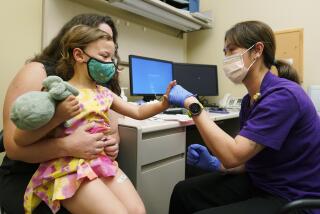Lollipops and Lessons
- Share via
In the world view of many young children, seeing the doctor offers one concrete payoff--a lollipop, sticker or some other material reward.
But famed pediatrician and international child-rearing guru T. Berry Brazelton, 78, aims to change all that with “Going to the Doctor” (Addison-Wesley, 1996), sort of an “Our Bodies, Ourselves” for kids. Written in Brazelton’s characteristic reassuring tone and targeted for children 5 to 12, the book sets out to enlist children in caring for their own bodies and demystify trips to the doctor: What are all those sharp instruments for? Why do I have to remove my clothes for some exams? How do I get through those scary shots?
“Children deserve to understand why they need to be dragged to their doctor’s office for checkups and immunizations,” said Brazelton, recently hip deep in toddlers waiting to have their books signed at Book Soup Bistro in West Hollywood. “They deserve to understand a doctor’s and nurse’s point of view in trying to prevent future illness. They are capable of turning this understanding into responsibility for their health. Even small children can benefit from learning how their bodies work.”
Brazelton was inspired to write after a child he knew, Max Dower, 6, asked him to write a book for kids. Max suggested something that would tell children about their doctor, adding that he thought doctor visits were meant to find kids’ “badness.”
“I had no idea that kids think we are looking for badness,” said Brazelton, who is professor emeritus of pediatrics at Harvard Medical School. “But in the medical model, we are really looking for deficits. So my feeling is that if we can give kids a sense of valuing doctor visits and a sense of knowing their own bodies, they will take care of themselves.”
Expressive illustrations done by Brazelton’s grandson, Alfred Womack, 9, capture the child’s-eye view in chapters categorized by body parts (“Your Ears,” “Your Belly” and “Your Private Parts”) and procedures (“Blood Pressure,” “Shots” and “Medicines”).
“I know that getting undressed in a strange place is one of the most embarrassing things I can ask of you,” he wrote in the chapter “Getting Undressed.” “So, take your time. And keep your underpants on. If I need to check underneath them, I can do it without you taking them off.”
In “Your Ears,” he wrote, “Using a metal tube with a light in it, called an otoscope, I can see into your ears. The little light makes it possible to see all the way to your eardrum. If you have too much wax in your ear canal, I can’t see the eardrum. If that happens, I ask your mother to put some drops in before you come. Then I can see the eardrum better. It is usually shiny and light pink.
And on shots: “If you need any shots to keep you from getting sick . . . hang on tight to your parents, and let out a yell if you want to. That will keep you from feeling so bad. Many kids are surprised when it is over so quickly and tell me it is no big deal.”
For parents, a list of 25 questions to ask your pediatrician is at the back of the book. Parents can also find Brazelton advice at a new World Wide Web site, the Pamper Parenting Institute’s “Total Baby Care” at https://www.totalbabycare.com.
More to Read
Sign up for our Book Club newsletter
Get the latest news, events and more from the Los Angeles Times Book Club, and help us get L.A. reading and talking.
You may occasionally receive promotional content from the Los Angeles Times.






